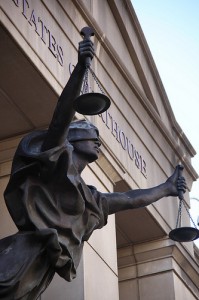Lis Pendens: What It Is and Why It Matters
BY MARK B. ZINMAN – WILLIAMS, ZINMAN & PARHAM PC
A Notice of Lis Pendens is a document recorded with the county recorder notifying the public that a specific piece of property is subject to litigation that may affect ownership of the property. When a Lis Pendens has been recorded against a property, the buyer takes title subject to the rights of the person who recorded the document. In other words, if the person wins the litigation, they can get title to property, even if the buyer paid for the property and was unaware of the Lis Pendens. It is because of this that title companies will generally not provide title insurance on properties that have Lis Pendens recorded against them.
A.R.S. § 12-1191 states that when a party files an action regarding title to a property and records a notice of Lis Pendens, “thereafter a purchaser or encumbrancer of the property affected shall be held to have constructive notice of the pendency of the action and the claims therein.” Even if the buyer was unaware of the Lis Pendens, the buyer is deemed to have notice of the litigation and takes title subject to the rights of the person who records the notice. This is an important reason to get title insurance and have a title company complete a title report before you buy a property.
In addition to affecting buyers, Lis Pendens can have significant effects on owners of property. Recently, I had a client contact me about a property he purchased at a trustee sale several months ago. After the sale was completed, the former owner (foreclosed borrower) filed suit against her bank alleging that the sale was invalid and recorded a notice of Lis Pendens with the county recorder. My client spent several thousand dollars upgrading the property and was unaware of the Lis Pendens until he contracted to sell the property to an end-buyer. He was unable to sell the property, as the Lis Pendens was precluding the title company from closing the transaction. Because of the specific claims in that suit, we knew that under Arizona law, there was no merit to the complaint. However, we were still required to obtain a court order releasing the Lis Pendens before the title company would insure the sale.
Because anyone can record a Lis Pendens by paying the recorder the $9.00 filing fee, statutes have been created penalizing a person for recording a frivolous Lis Pendens. A.R.S. § 33-420 provides that a person who wrongfully records a Lis Pendens can be liable for statutory damages, attorneys’ fees and costs to the property owner. While these damages are meant to deter people from filing frivolous Lis Pendens, they give little comfort to an owner who cannot sell a house due to a frivolous recording. In these situations, it is necessary for the owner to intervene in the lawsuit and move to quash the Lis Pendens. Alternatively, the owner could file a separate lawsuit (special action) for the sole purpose of determining whether the Lis Pendens is valid.
It’s important to note that a court will only adjudge a Lis Pendens to be frivolous if there is no pending litigation or if there is a lawsuit, but it is not one “affecting title to real property.” Therefore, just because a plaintiff sues a defendant and eventually wants to put a lien on the defendant’s house, that doesn’t mean that the litigation affects real property. The litigation itself has to involve title to the property before a Lis Pendens would have merit. On the other hand, the court is not analyzing the merits of the case, only whether the case involves a claim to title. If a plaintiff files a quiet title suit against a defendant, even if there is no merit to the complaint, the Lis Pendens will not be quashed until the litigation is completed. If you are thinking of recording a Lis Pendens or are seeking to invalidate one, it’s important that you understand the legal liability and appropriate actions to take.
Reprinted with permission. © 2011 Williams, Zinman & Parham PC – Attorneys at Law – 480-994-4732. Use hereof is strictly prohibited without written permission.
 Mark B. Zinman is a partner at Williams, Zinman & Parham PC in Scottsdale. Since joining the firm in 2005 and becoming a partner in 2008, he has handled cases before all levels of Arizona state court as well as the United States District Court – District of Arizona. A large portion of his practice involves handling real estate matters for property owners, property managers and investors. This includes evictions, quiet title and easement litigation, fair housing disputes and litigation resulting from trustee’s sales. In conjunction with such work, Zinman has presented seminars to the Arizona Multihousing Association (AMA) and is a regular instructor at the Arizona School of Real Estate and Business.
Mark B. Zinman is a partner at Williams, Zinman & Parham PC in Scottsdale. Since joining the firm in 2005 and becoming a partner in 2008, he has handled cases before all levels of Arizona state court as well as the United States District Court – District of Arizona. A large portion of his practice involves handling real estate matters for property owners, property managers and investors. This includes evictions, quiet title and easement litigation, fair housing disputes and litigation resulting from trustee’s sales. In conjunction with such work, Zinman has presented seminars to the Arizona Multihousing Association (AMA) and is a regular instructor at the Arizona School of Real Estate and Business.
